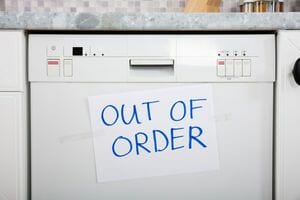 Dishwasher failure signs range from all-too-obvious to subtle. Depending on the age and the make and model, failure signs might be apparent or hard to detect. Although this is a very simple household machine, it’s operation is complex. Meaning, there are several things to look out for if you suspect it’s dying out. Read on to learn about the most common dishwasher failure signs.
Dishwasher failure signs range from all-too-obvious to subtle. Depending on the age and the make and model, failure signs might be apparent or hard to detect. Although this is a very simple household machine, it’s operation is complex. Meaning, there are several things to look out for if you suspect it’s dying out. Read on to learn about the most common dishwasher failure signs.
About Appliance Disposal
If the dishwasher is failing, you’ll need to replace it. But, it could be an easy fix to get it running properly again. One common problem is a bad heating element. Just like those in the oven and water heater, metal coils provide heat. So, wet or damp dishes might well be due to a bad heating element. An obstructed spray arm is another common problem.
Simple maintenance will wipe out 90 percent of dishwasher problems. The three common problems are: the dishes don’t come out clean, the dishwasher leaks water, and the dishwasher won’t start. We’ll show you how to make the fixes yourself and save the money you would have paid a repairman. —Family Handyman
If water leaks from the appliance, it’s probably a bad door gasket. That can be replaced to maintain a watertight seal. If the door gasket isn’t the culprit, it might indicate a stuck float switch. The float switch is the mechanism which causes the appliance to drain at a certain water level. Of course, if it’s just simply going bad outright, you’ll need to schedule appliance removal and replace the dishwasher.
Dishwasher Failure Signs San Jose Residents should Heed
Before you start shopping around for a new appliance, ensure the dishwasher is on its last leg. Because a dishwasher, like other major appliances, has several components, there’s often at least one or more telltale signs it’s going bad. Here are the most common dishwasher failure signs:
- The machine cycles but dishes aren’t clean. If you open a dishwasher after running it and the dishes aren’t clean, it could be a clog, bad spray arms or the dishes were loaded to close and/or too many dishes were put inside the appliance. Rerun the dishwasher with fewer dishes. If the dishes are clean, it’s okay but if the dishes are dirty, there’s a problem.
- Water pools around the bottom of the appliance. A big, unmistakable sign there’s something really wrong is water puddles around the bottom of the machine. This could be due to bad seals, leaking pipes or a combination of parts going bad.
- Underfilling or overfilling with water. When a dishwasher overfills or doesn’t supply enough water, it could be due to the float switch, a clogged pipe, the water inlet valve or something else. If this does happen, it’s likely the machine needs to be replaced.
- Strange noises during operation. It’s common for sounds to come from a dishwasher during its operation. You’ll hear whirring and water spraying most often. But, if you hear weird noises, like a thumping sound or a humming sound, that’s cause for concern.
- The appliance doesn’t drain. If you notice excess water in the appliance after running it, then it could be due to a clogged drain line, clogged filters, clogged strainers or something else. Don’t continue to use it if this is the case.
If you need appliance removal for you home, business, rental property or elsewhere in San Jose, just phone 408-722-9316 or visit Junk Garbage Removal.


